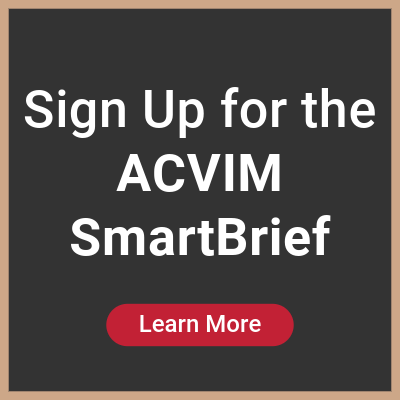July 2021 Message from the CEO

Reflecting on the events of the last year, I am struck by how quickly our world and our profession are changing. The ACVIM must change along with it, taking into consideration how the external forces we are experiencing will influence our priorities. Our organization is entering an exciting period of growth, and we are beginning to adapt our systems to better align with the demands and complexity of this phase of our evolution. You have seen some of this as we shifted to a virtual ACVIM Forum and remote exam administration, and while we are eager to be back together in person, we also recognize that some of these changes are here to stay. The combination of external forces and internal growth means that we’re all going to need to continue learning and thinking differently in order for our organization to continue to grow and thrive.
One of the macrotrends (the external forces referenced above) our profession is experiencing includes the ongoing, now urgent, shortage of veterinarians. This is most acutely felt in the small animal ER and specialty sectors, where demand for qualified doctors and technicians has been increasing over the last 10 years. Now, in the face of the 30%+ increase in caseload in many types of practices, the inability to find doctors to hire has become an enormous stressor for practice owners, administrators, and for the staff who are asked to do more, see more and work harder with less. In addition, consider how deeply the specialist shortage might affect us as a professional certifying and education organization. The ACVIM and other specialty organizations have an opportunity to work collaboratively to examine our role in broadening the pipeline for new specialists. In our role as the largest veterinary specialty organization, the ACVIM should also be considering how we may provide resources to help our specialists working as clinicians have the tools to take care of themselves, while also examining how we can influence the larger practice groups and universities to better support their staff.
Another major macrotrend that is driving change is the social justice movement. Over the last 12 months we’ve seen a tremendous shift in how we think about and talk about these issues. While the ACVIM Board of Regents has expressed an appropriate desire to steer clear of politics, the line between human rights, our value of inclusivity, and politics has become increasingly blurred. With respect to DEI (diversity, equity and inclusion), it is no longer possible, nor appropriate, for any business or organization to stand on the sidelines. Along with a focus on building essential foundational knowledge through DEI education for staff and the board, the upcoming formation of a standing committee focusing on DEI will help us consider social justice in all aspects of the ACVIM’s work, providing an enormously valuable perspective that will help us as an organization and also the larger veterinary profession.
As we consider the challenges in hiring and retaining specialists, and the need to focus on how we provide value to our membership, DEI perspectives become even more pressing as these issues are deeply intertwined and impact our ability to achieve the ACVIM mission and vision. One specific example is wellbeing and mental health issues, which lead to shorter duration in the profession across all sectors of the veterinary profession. Members of historically underrepresented groups are at a particularly high risk for factors that lead to early retirement and/or depression due the extra burden of stress they experience. In the coming months, look for online resources on the acvim.org website, as a next step in tackling this important issue.
A final macrotrend I’ve been reflecting on is the general lack of trust and civility in our broader culture. In the ACVIM, this is reflected in how our members communicate with each other and with the elected leaders representing them. While on whole, our members respect and appreciate staff, elected leaders, volunteers and each other, it is clear that we need to do more to foster an environment of trust, focusing on assuming positive intent first and foremost. I invite you to join Dr. Harold McKenzie, ACVIM President and I for a virtual townhall on July 15 for an interactive discussion of some key topics currently underway. You should have received an invitation with more information on how to join. Please reach out to Membership@ACVIM.org for more information.
As the Board and the ACVIM staff continue to work together to navigate these challenging times, we will incorporate thinking about how external forces will shape the work we do, and will consider all ideas in the context of impact to our membership.
